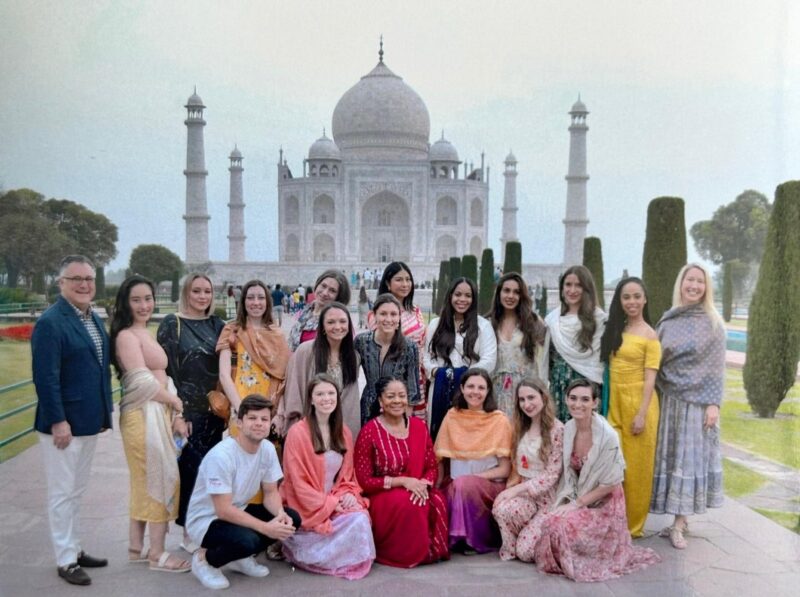
On June 22, the Cosmetics and Fragrance Marketing and Management (CFMM) Class of 2023 gave its capstone presentation, titled Beauty in a Shifting Global Landscape, in the Haft Theater at FIT. (You can access the full press release on the CFMM capstone website and play video of the event below and on Vimeo.) The work presented was based on the students’ travels to the United Arab Emirates and India this spring to research emerging markets and new drivers of growth for beauty brands and ways to identify and engage the global consumer over the next decade.
Newsroom sat down with CFMM associate professor Nicole Howard to learn more about the trip and its impact on the research.
Newsroom: You accompanied the students from the CFMM Class of ’23 as they completed their field study research covering emerging markets in India and the United Arab Emirates. Can you share a small preview into how the trip impacted the findings that will be shown during the capstone presentations June 22?
Nicole Howard: The FIT CFMM International Field Study was an impactful and very relevant learning opportunity for the graduate students that will directly influence their capstone presentations. This is a pivotal year for India. India has just taken over China as the world’s most populous country. There are going to be significant changes in India’s politics, economics, technology, culture and environment, and India is one of the fastest growing economies in the world. The opportunity to understand India’s evolution as a country along with having the youngest consumer market that will have increased power in consumer spending over time will have macro impacts to the global consumer goods market and the beauty industry.
The speed at which the United Arab Emirates has grown is also an important phenomenon that the graduate students experienced. To understand the influence that Dubai and Abu Dhabi have by being at the forefront of innovation is also another insight that will greatly influence capstone presentations topics covering both the Future Consumer and the Future of Talent.
The students met with hosts from local and global brands and immersed themselves in the culture to truly understand the nuances of the regions. What were some things that stood out from the trip that could not have been learned from a book or a chart?
- The graduate students spent a morning in Bagru, a town outside of Jaipur. They were able to witness a day in the life of the residents of an Indian community. They learned about their unique trade of traditional wooden block handprinting and how this trade supports their well-being. This craft is recognized around the world and these experts do business with international retailers. This understanding of how a local trade has global impact on their economic quality of life.
- The group was honored to have Jaffrey Zaman, managing director of Intercos India as a guest speaker. Intercos is one of the largest manufacturers of cosmetics globally. Zaman shared the vision for India’s future and the opportunities in the beauty space for international brands to capture the hearts of Indian consumers. These elements are important strategies for international brands to win in India.
- Meeting with the House of Beauty’s founder, the students learned impactful details on beauty retailing, managing distribution of international brands and the impact of technology to the consumer. India is set to become the third largest online retail market globally after the United States and China. Adopting both a mobile-first and omni-channel mindset will be key strategies that the beauty industry will need to be prepared for to resonate with the Indian consumer.
What were some things from the trip that surprised you?
- India is highly focused on skill development for youth and is focused on developing various training programs to ensure that future talent is well equipped to succeed professionally.
- India has very digitally savvy individuals; technology will be used to disrupt business through every touchpoint.
- There are many parallels to China 15 to 20 years ago, but the prediction is that India will grow even faster.
- The speed of growth in the United Arab Emirates is surprising, as is Dubai’s influence as the fastest growing city on earth.
Play the full capstone presentation below or on Vimeo.
